Presentation
The theme of this 4th edition of the International Rencontres de Reims in Sustainability Studies was ‘Urban Transitions to Sustainability’.
Nearly 70% of the world population lives in urban areas and nearly 75% of economic activity is located therein. Urban areas concentrate not only wealth but also extreme poverty and environmental degradation. Despite the significant progress in urbanization, still a billion people live in the slums of urban areas. The issue of urban transitions to sustainability is a major challenge. In Europe, the 2007 Leipzig Charter puts “sustainable cities” on top of the agenda for sustainability. Two years later, the situation report of the European Commission on the European Union Sustainable Development Strategy considers the issue of “Sustainable Cities” as a major axis.
Nevertheless, these initiatives should not lead to a standardized approach to urban transitions to sustainability, but rather to recognize and promote the diversity of paths that lead to sustainable cities. Despite differences in history, type of development, size and heritage, cities still have an unexplored potential in adaptability.
Even if there are several means and pathways for the transition towards sustainability of urban areas, heuristic tools are still needed to help cities to take decisions and assess their relevance. What kind of issues, convergences and disagreements do transitions towards sustainability of urban areas face today? That is the topic of the 4th Rheims International Conference in Sustainability Studies.
This 4th edition of the Rencontres Internationales de Reims on Sustainability Studies was organized around three complementary events:
- A “residential” international seminar…
- …followed by a conference open to the public
- A “parallel” summer school
A “residential” international seminar…
The closed seminar was structured around three workshops with around fifteen participants. Each workshop had focused on one of the following themes:
- What dialogues and what conflicts between science, technology and society to achieve a transition to sustainability of urban areas?
- What horizons to think the transition: expanding cities – shrinking landscape vs. shrinking cities – expanding landscapes?
- What kind of relations among the various scales of action and among the different systems of actors can create the conditions of a transition to sustainability for urban areas?
During these workshops, some participants hold the roles of chair, keynote speaker and rapporteur:
| Date and time | Session | Chair* | Keynote** | Rapporteur*** |
|---|---|---|---|---|
| Tuesday 24 june 11:30am -12:00pm |
Opening session |
|||
| Tuesday 24 june 2:00pm – 5:00pm |
Workshop 1 | N. Salingaros | S. Jasanoff | D. Reckien |
| Wednesday 25 june 9:00am – 12:00pm |
Workshop 2 | B. Secchi | C. Ghorra-Gobin | N. Salingaros |
| Wednesday 25 june 2:00pm – 5:00pm |
Workshop 3 | F. Mancebo | M. Sargolini | M. Hisschemöller |
* Chair: Control and distribution of speaking time
** Keynote speaker: Preparing theme in 20 minutes introducing the debate
*** Rapporteur: Writing a report which will be presented orally at the conference Thursday, June 26 and will then be put online
These workshops have received support from the house of Veuve Clicquot that put at our disposal a seminar room, offered us lunch, gala dinner and a visit of the cellar on the margins of the two-day workshops.
A conference open to the public
An international conference open to the public had taken place on Thursday, June 26th in order to communicate and debate the findings of the residential part of the event.
The public conference of these 4th edition of the International Rencontres de Reims in Sustainability Studies hold on Thursday 26 June 2014 in the Town Hall of Reims with the participation of Nikos Salingaros, Massimo Sargolini, Cynthia Ghorra-Gobin, Matthijs Hisschemöller and François Mancebo.
After an opening by the authorities and a high-level speech by one of the participants, the three rapporteurs had presented the main findings of each workshop. In the second part of the final conference, a panel discussion and debate had been organized with the public on the contents presented in the morning.
Program and videos
Thursday 26 June 2014
9:30 am – Welcome Speech
Nathalie Miravette – Maire adjointe on Urban Planning
Jacques Meyer – Premier vice-président du Conseil Régional de Champagne-Ardenne délégué à l’enseignement supérieur
Gilles Bayat – President of the University of Reims
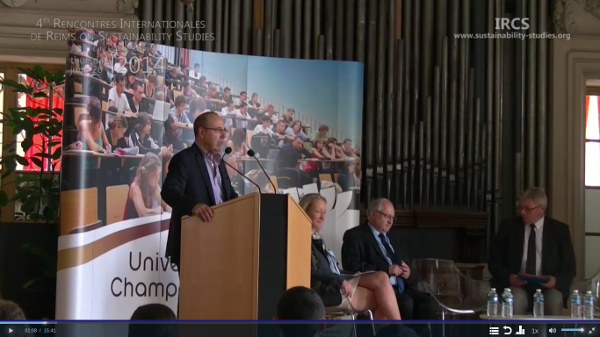
10:00 am – Introductory remarks
François Mancebo – Professor at the of the University of Reims Champagne-Ardenne
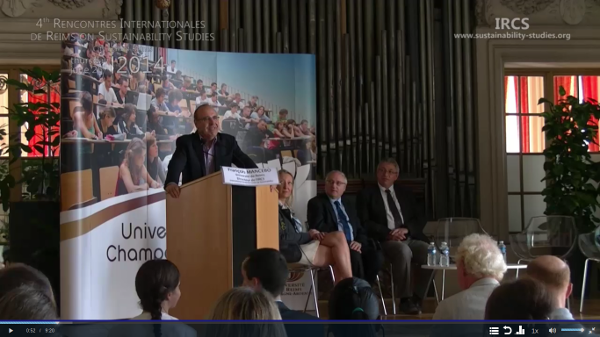
10:15 am – Introduction – Urban Transitions to Sustainability
Nikos Salingaros – Planner, Architectural Theorist and Professor of Applied Mathematics at the University of Texas at San Antonio, United States
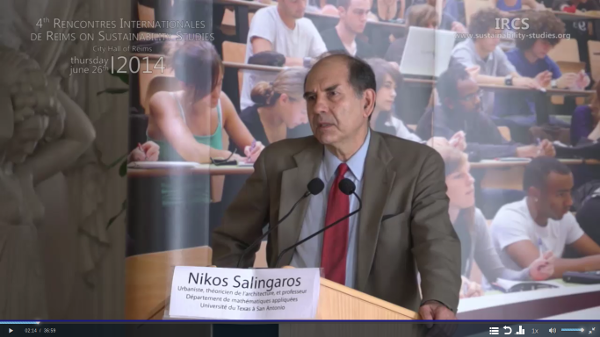
Restitution of the workshops
10:50 am – 1st workshop – What dialogues and what conflicts between science, technology and society to achieve a transition to sustainability of urban areas?
Diana Reckien – Senior Climate Impact Scientist at Climate Analytics Berlin, Germany
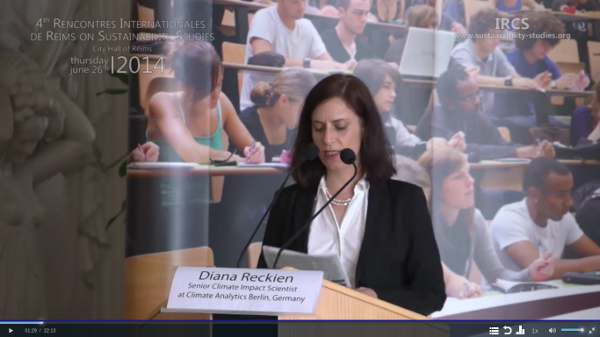
11:10 am – 2nd workshop – Horizons to What think the transition: expanding cities – shrinking landscape vs. shrinking cities – expanding landscapes?
Nikos Salingaros – Planner, Architectural Theorist and Professor of Applied Mathematics at the University of Texas at San Antonio, United States
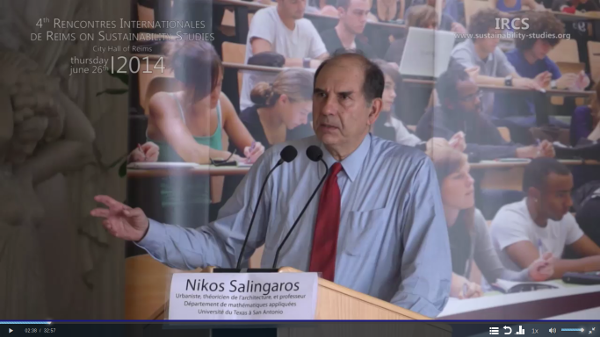
11:30 am – 3rd workshop – What kind of relations among the various scales of action and among the different systems of actors
can create the conditions of a transition to sustainability for urban areas?
Matthijs Hisschemöller – Researcher at the Free University of Amsterdam, The Netherlands
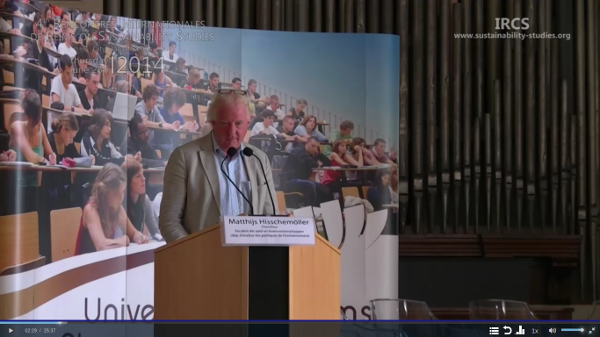
11:50 am – Discussion with the audience
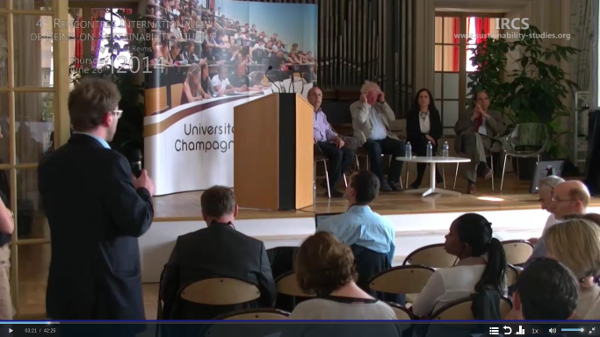
12:50 am – Buffet
2:00 pm – Graduation of the participants of the Summer School 2014
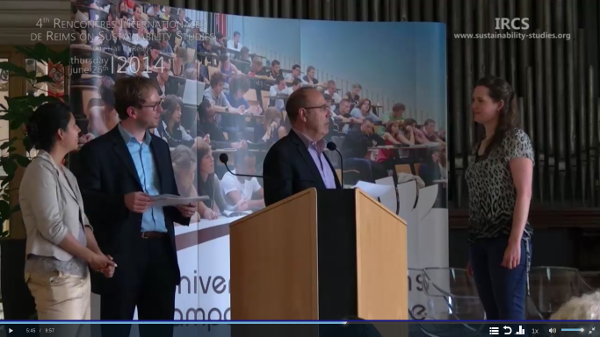
Roundtable
2.30 pm – Which sustainability City for Tomorrow?
Matthijs Hisschemöller – Researcher at the Free University of Amsterdam, The Netherlands
François Mancebo – Professor at the of the University of Reims Champagne-Ardenne
Massimo Sargolini – Associate Professor of Urban Planning at the School of Architecture and Design of the University of Camerino, Italy
Hélène Valade – Director of Sustainable Development, Suez Environnement
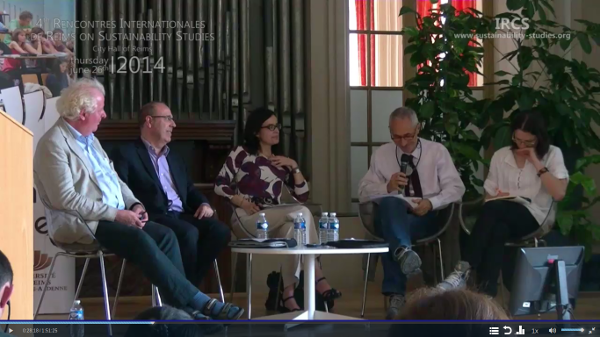
5.00 pm – End of working

